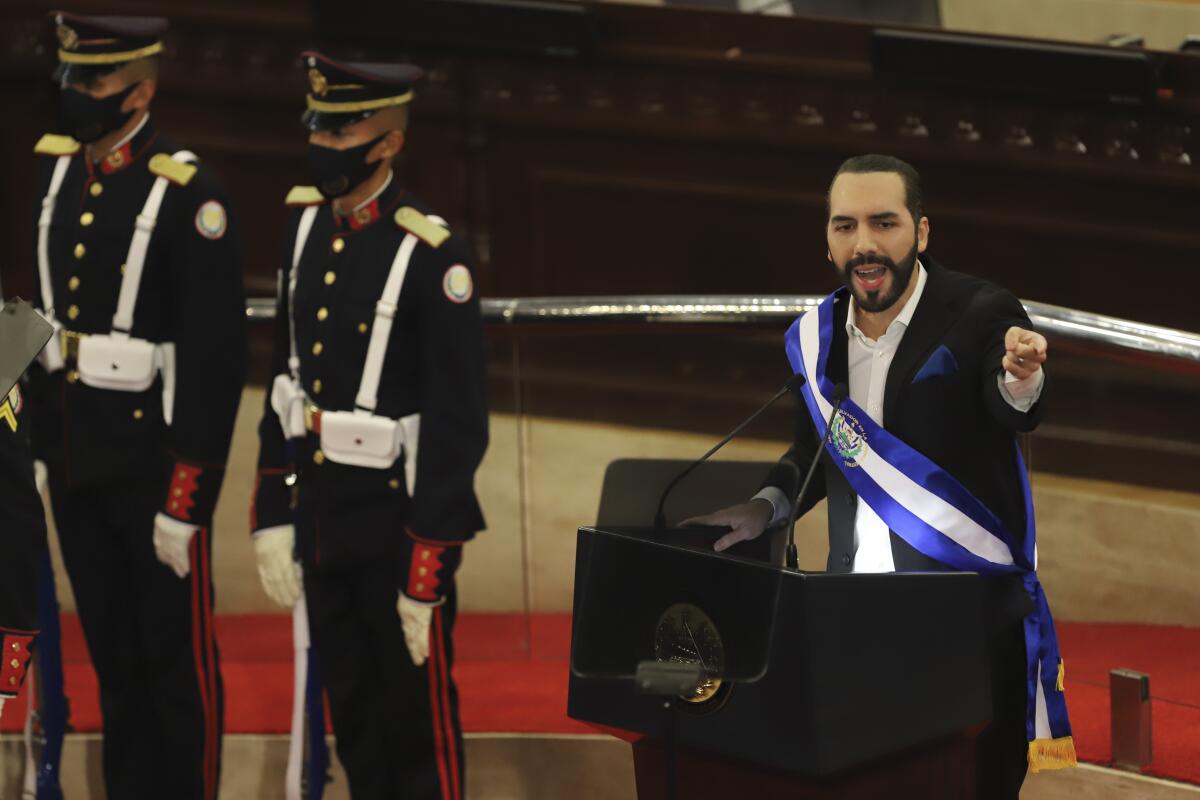U.S. expanding list of ‘corrupt’ officials in Central America

- Share via
WASHINGTON — The Biden administration is significantly expanding a list of Central American officials deemed too corrupt to work with or to be allowed to enter the United States.
The list, first developed last year under congressional mandate, will make it difficult for some Central American governments to do business in Washington and will complicate Washington’s efforts to fight illegal immigration from the so-called Northern Triangle countries — El Salvador, Honduras and Guatemala — because numerous potential partners would be disqualified.
People on the list are denied U.S. visas, barred from traveling to the U.S. and considered off-limits to U.S. businesses and most government programs.
“Those sanctioned include former and current high-ranking government officials who have harmed their country’s democracy, further destabilized their communities, and chosen personal gain over public good,” said Rep. Norma Torres (D-Pomona), one of the original architects of the “Engel list,” named for former Rep. Eliot Engel, a Democrat from New York and frequent advocate for international human rights.
Torres added that the blacklisted officials “will finally face consequences” for their “antidemocratic, corrupt actions.”
The State Department announced release of the expanded list Wednesday evening. In a statement, Secretary of State Antony J. Blinken accused those named of the “undermining of democratic processes and institutions” that ultimately contributes to “irregular migration and destabilizing societies.”
The State Department did not immediately detail names on the list but said it included 60 additional people, doubling the original 50 named last year.
However, people familiar with the list said it includes several senior members of Salvadoran President Nayib Bukele’s administration and a number of wealthy business figures linked to Guatemalan President Alejandro Giammattei.
At least one advisor to the new president of Honduras, Xiomara Castro, will also appear on the list. Earlier this year, Castro replaced President Juan Orlando Hernández, who has since been extradited to the U.S. in connection with a massive drug-trafficking case, and Biden administration officials had hoped the new president would head a less corrupt government.
All three presidents declined an invitation from Biden to attend last month’s Summit of the Americas, a major regional gathering that was hosted by the U.S. for the first time in three decades and held in Los Angeles. Those presidents, along with another no-show, Mexican President Andrés Manuel López Obrador, were protesting Biden’s refusal to invite Cuba, Venezuela and Nicaragua to the summit.
The list came out last year just as Biden put Vice President Kamala Harris in charge of efforts to stem illegal immigration from Central America. Her strategy was to fight “root causes” of poverty, violence and corruption that drive Central Americans from their homes.
But almost immediately, she found herself in search of partners because the region’s presidents were seen as intolerably corrupt or antidemocratic.
Harris attended Castro’s inauguration, but hopes for cooperation from Honduras’ government may be fading.
The updated list also adds officials from Nicaragua, not considered one of the Central American countries with the highest number of people fleeing to the U.S., but one seen as harboring an increasingly corrupt and brutal government. Numerous members of the government run autocratically by President Daniel Ortega and his wife and vice president, Rosario Murillo, as well as many of their relatives and associates, have already been slapped with economic sanctions from Washington. Inclusion on the Engel list is an additional layer of punishment.
Ortega has imprisoned or driven into exile several hundred dissidents and political opponents. Several Nicaraguan judges will also be named on the new blacklist.
Bukele has taken a decidedly autocratic turn since his election, firing judges and the attorney general, and engineering his party’s takeover of El Salvador’s Legislative Assembly. El Faro, a Salvadoran news outlet highly regarded in the region and regularly attacked by Bukele, reported that the government’s treasury minister, Alejandro Zelaya, is named on the updated list, even as he attempts to renegotiate El Salvador’s foreign debt with the International Monetary Fund, based in Washington, where Zelaya would no longer be able to travel.
There was no official comment from any of the sanctioned officials except for the head of the legislative delegation of Bukele’s New Ideas party, Christian Guevara, who told Salvadoran newspapers that his U.S. visa had been canceled but that he was proud to have been sanctioned for doing what he thought was right for his country.
More to Read
Get the L.A. Times Politics newsletter
Deeply reported insights into legislation, politics and policy from Sacramento, Washington and beyond. In your inbox twice per week.
You may occasionally receive promotional content from the Los Angeles Times.











